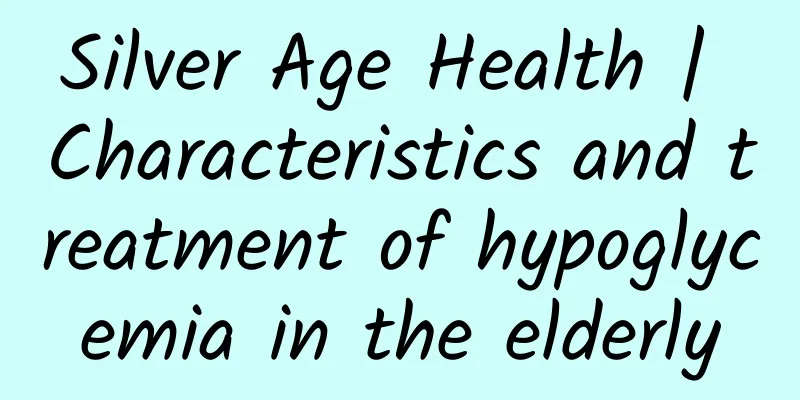Silver Age Health | Characteristics and treatment of hypoglycemia in the elderly

|
my country has entered an aging society. According to statistics, there will be about 270 million elderly people aged 60 and above in my country in 2022, of which more than 30% are diabetic patients. Abnormal blood sugar is a common problem for many elderly people. When hypoglycemia occurs in the elderly, it will cause symptoms of sympathetic nerve excitement, and some will cause hypoglycemic encephalopathy, which can cause great harm to elderly patients. Therefore, once symptoms of hypoglycemia occur in the elderly, they should seek medical treatment in time to avoid serious consequences. ▏Some characteristics of hypoglycemia in the elderly Hypoglycemia in the elderly has the following characteristics: 1. Atypical symptoms Hypoglycemia in young people usually manifests as dizziness, fatigue, sweating and other symptoms due to insufficient energy supply, while the nervous system of the elderly is less sensitive to hypoglycemia, so even if blood sugar is very low, there may be no obvious symptoms, or some non-specific symptoms such as weakness, confusion, mood changes, etc. Once unexplained changes in temper or abnormal behavior occur, you should be alert to the possibility of hypoglycemia. 2. Prone to recurring attacks The elderly have declining physical functions, low immunity, and are susceptible to infection. Once an infection is induced, it will cause or aggravate hypoglycemia. In addition, the elderly have irregular diets, often dieting, malnutrition, etc., which can also easily induce hypoglycemia. 3. Prone to hyperinsulinemia Hyperinsulinemia refers to an excessive increase in the level of insulin in the blood, which exceeds the normal needs of the body. It is a pathological state. The hazards of hyperinsulinemia mainly include the following aspects: (1) May cause lipid abnormalities Hyperinsulinemia may lead to abnormal blood lipid levels, such as increased low-density lipoprotein and triglyceride levels and decreased high-density fatty acid levels, which can increase the risk of cardiovascular diseases such as atherosclerosis. (2) Can cause hypoglycemia In cases of hyperinsulinemia, the body continuously produces insulin, causing blood sugar to constantly drop. When too much insulin is secreted, it can cause symptoms of hypoglycemia, such as dizziness, headache, and weakness. (3) Affects blood pressure Hyperinsulinemia may be associated with hypertension, which may increase the risk of cardiovascular disease. (4) Can cause obesity Long-term hyperinsulinemia can cause the body to become resistant to insulin, requiring more insulin to maintain normal blood sugar levels. Excessive insulin does not promote the absorption and utilization of sugar by body cells, but instead stimulates the synthesis of fat, leading to obesity. 4. Serious complications are likely to occur The elderly have poor metabolic capacity and weak recovery ability. Hypoglycemia can easily aggravate existing diseases and even induce many serious complications, such as fractures, cardiovascular and cerebrovascular accidents, etc. 5. It is difficult to control blood sugar The elderly are less sensitive to hypoglycemic drugs, and the drug dosage should not be too large, otherwise it is easy to cause hypoglycemia. In addition, the elderly have irregular diets and their calorie intake is prone to fluctuate, which is not conducive to blood sugar control. 6. Acute onset and rapid progression Elderly patients with hypoglycemia may suddenly experience symptoms such as headache and coma in a short period of time, and may even die. This is mainly because the brain nerve regulation function of the elderly degenerates. In summary, prevention is the key for elderly patients with hypoglycemia. In daily life, the elderly should pay attention to regular diet and avoid infection and other factors that induce hypoglycemia. If the elderly have suspected symptoms of hypoglycemia, they should monitor their blood sugar in time and seek medical attention in time according to their blood sugar situation. ▏Which elderly people are more likely to suffer from hypoglycemia? The elderly are more susceptible to hypoglycemia than the young, mainly due to their physical condition and lifestyle. The following are some elderly people who are susceptible to hypoglycemia: 1. Elderly people with underlying diseases The elderly usually suffer from multiple chronic diseases, such as diabetes, hypertension, coronary heart disease, etc. These diseases require long-term medication control, and some drugs may cause hypoglycemia. 2. Decreased digestion and absorption function As people age, their digestive and absorption functions gradually decline, which may lead to insufficient sugar intake and cause hypoglycemia. 3. Slow exercise and metabolic rate The elderly exercise relatively less, have a slower metabolic rate, and consume relatively slower energy, which can easily lead to hypoglycemia. 4. Irregular diet Due to bad teeth, picky eating, loss of appetite and other reasons, the elderly may not consume enough sugar and are prone to hypoglycemia. 5. Improper use of medication The elderly may use multiple medications at the same time, including hypoglycemic drugs, antihypertensive drugs, sedatives, etc. If used improperly, hypoglycemia may easily occur. 6. Poor mental state The elderly may have problems such as memory loss, vision and hearing loss, and are prone to taking the wrong or missed medications, leading to hypoglycemia. 7. Elderly people with other diseases For example, obese people and people with sleep apnea syndrome may experience repeated hypoglycemia while sleeping. ▏How can the elderly prevent and deal with hypoglycemia? There are several ways for older people to prevent hypoglycemia: 1. Eat a healthy diet The elderly should follow the principle of eating small and frequent meals, with a variety of food and appropriate control of food intake. For the frail or thin elderly, they should pay attention to checking their blood sugar and food intake, increase nutrition appropriately, and avoid hypoglycemia caused by insufficient food intake. suggestion: (1) Ensure adequate daily calorie intake, especially for the elderly who are already thin, who should increase their nutrition appropriately. (2) Food varieties should be diverse, including staple foods, vegetables, proteins, etc., and the amount of food intake should be appropriately controlled to avoid hypoglycemia caused by insufficient food intake. (3) If blood sugar remains unstable after dietary adjustment, the treatment plan should be adjusted under the guidance of a doctor. 2. Exercise moderately Moderate exercise can help the elderly strengthen their physique and improve their immunity. When exercising, be careful not to do strenuous exercise on an empty stomach, which can easily cause hypoglycemia. It is recommended to do appropriate aerobic exercise 1 hour after a meal. suggestion: (1) Choose a form of exercise that suits you, such as walking, Tai Chi, etc., and avoid strenuous exercise. (2) The exercise time should not be too long so as not to cause symptoms of hypoglycemia such as palpitations and sweating. 3. Regular monitoring The elderly should check their blood sugar regularly to keep abreast of their blood sugar levels. If abnormal blood sugar levels are found, they should seek medical attention in a timely manner so that treatment plans can be adjusted. suggestion: (1) The elderly should go to the hospital regularly to check their blood sugar levels and understand their own blood sugar conditions. (2) If abnormal blood sugar levels occur, seek medical attention promptly so that treatment plans can be adjusted. 4. Rational use of drugs The elderly should strictly follow the doctor's advice, take hypoglycemic drugs on time and in the right amount, and do not change the dosage at will. For the elderly who use insulin, blood sugar should be checked regularly and the insulin dosage should be adjusted in time according to the blood sugar situation. suggestion: (1) Take hypoglycemic drugs on time and in the prescribed dosage. Do not change the dosage at will. (2) Elderly people who use insulin should check their blood sugar regularly and adjust the insulin dosage in a timely manner according to their blood sugar levels. (3) When changing medications or increasing medication dosages, you should communicate with your doctor to find out whether hypoglycemia may occur. 5. Keep your emotions stable Mood swings can affect blood sugar levels. The elderly should maintain emotional stability and avoid the influence of negative emotions such as excitement and tension to avoid hypoglycemia. suggestion: (1) Mood swings can affect blood sugar levels, so the elderly should maintain emotional stability and avoid the influence of negative emotions such as excitement and tension. (2) Learn how to regulate your emotions, such as listening to music, reading, etc., to reduce the impact of emotional fluctuations on blood sugar. 6. Pay attention to details Before taking any medicine, you should inform your doctor of your physical condition, including whether you have other diseases or are taking any medicine. If you experience symptoms such as palpitations, dizziness, cold sweats, etc., you should seek medical attention immediately. suggestion: (1) Before taking any medication, you should inform your doctor of your physical condition and any medications you are currently taking. (2) In terms of diet, avoid eating high-sugar foods such as candy, chocolate, etc. Also avoid drinking alcohol and other stimulating beverages. (3) Pay attention to your physical condition. If you experience symptoms such as palpitations, dizziness, or cold sweats, seek medical attention immediately. In short, the prevention of hypoglycemia in the elderly requires comprehensive adjustments in diet, exercise, medication, and emotions. At the same time, attention to details and self-monitoring are required, and timely medical treatment and adjustment of treatment plans are required. Through the implementation of these measures, the occurrence of hypoglycemia can be effectively prevented and the quality of life of the elderly can be improved. There are several ways that older people can cope with hypoglycemia: 1. Take medication regularly If you are a diabetic, you need to adjust the dosage and time of medication under the guidance of a doctor to avoid hypoglycemia. If you are taking medications such as insulin sensitizers, you may also need to adjust them under the guidance of a doctor. At the same time, be careful to avoid drinking alcohol, beverages, and other behaviors that can easily cause hypoglycemia. 2. Carry candies, biscuits and other food with you If you feel dizzy or other symptoms of hypoglycemia, you can eat it in time to relieve the symptoms. 3. Monitor blood sugar regularly The elderly should monitor their blood sugar regularly and understand blood sugar fluctuations so that they can better cope with hypoglycemia. 4. Seek medical attention promptly If elderly people often experience symptoms of hypoglycemia and the symptoms cannot be relieved by adjusting their diet, taking medication, etc., they should seek medical attention promptly and seek advice and treatment from a professional doctor. The specific operation also needs to be based on individual circumstances. The physical condition, nutritional needs, and activity level of each elderly person are different, so a personalized plan needs to be developed based on the specific situation. If the symptoms are severe or there is a suspected hypoglycemic coma, an ambulance should be called immediately and the patient should be sent to a doctor for emergency treatment. ▏Foods suitable for elderly people with low blood sugar Hypoglycemia is a common health problem in the elderly. For the elderly, nutritionally balanced, low-sugar, high-fiber foods are key. Here are some food recommendations for elderly people with hypoglycemia: 1. High-fiber foods High-fiber foods can help delay the rise of blood sugar, thereby reducing the risk of hypoglycemia. Some high-fiber foods such as whole wheat bread, brown rice, fruits, and vegetables can help keep blood sugar stable. 2. High-quality protein High-quality protein such as lean meat, fish, eggs, beans, etc. are also good choices because they can provide the amino acids needed by the body, thereby reducing the occurrence of hypoglycemia. 3. Fats For the elderly, it is also necessary to consume a moderate amount of fat. Healthy fats such as olive oil, fish oil, etc. can help control blood sugar. However, be careful to avoid excessive saturated fat and trans fatty acids. 4. Fruits with low sugar content Although fruits contain sugar, some fruits (such as apples, strawberries, blueberries, etc.) are low in sugar and rich in antioxidants, which are good for health. When eating fruits, it is recommended to choose these low-sugar varieties. 5. Protein Foods Protein foods such as eggs, tofu, lean meat, etc. can slowly release energy and help prevent the occurrence of hypoglycemia. 6. Eat enough carbohydrates Carbohydrates are the main source of energy for the body, but in order to avoid hypoglycemia, you should choose foods with a lower glycemic index (GI), such as brown rice, whole wheat bread, etc. 7. Nuts Nuts such as walnuts and almonds are also rich in nutrients and help the body recover. 8. Others Such as pure milk, oatmeal, sugar-free biscuits, etc., these are all foods that can be chosen by the elderly with hypoglycemia. It should be noted that the physical condition of the elderly is relatively special, and the ingredients and digestibility of the food must be considered when choosing food. In daily life, you should develop the habit of eating small meals frequently and try to avoid eating foods with high sugar content. If the symptoms are severe, you need to seek medical attention in time. If necessary, you can take medicine to relieve them. (Picture from the Internet) |
<<: How are those who always do manicures doing now?
Recommend
What is the best way to perform pelvic floor muscle rehabilitation?
The most important physiological period in every ...
What to do if a pregnant woman has blisters
When a woman becomes pregnant, her body will unde...
What to do if the endometrium shows hyperplasia
Gynecological diseases are particularly harmful t...
How to exercise vaginal contraction for postpartum women
After giving birth, especially after a normal bir...
What is the reason for the continuous bleeding during menopause?
Generally speaking, when women reach menopause, t...
What if I haven't had my period for a month and I'm not pregnant?
Many people regard amenorrhea as a symptom of pre...
Does pregnant mother's diarrhea affect the baby?
Diarrhea is very common, and pregnant women in ea...
Can I drink rose tea during my period?
Female friends always have a few days of low mood...
What should women do with pelvic fluid accumulation after surgery?
The female body is affected by many factors and o...
Cancer is caused by "saving"! Doctors reveal the truth! This bad habit must be changed
Experts in this article: Hu Houxiang, Chief Physi...
What to do if a girl has stomach pain during menstruation
Women have their first menstruation every month. ...
What causes a lump in the breast?
Some female friends may experience lumps in their...
How many days of bleeding after abortion is normal?
Many female friends may experience bleeding after...
If you want to have a healthy breakfast, the three major types of nutrients are essential!
Reviewers of this article: Pa Lizhe, chief physic...
What are the consequences of crying during confinement?
When we are sad, tears will flow uncontrollably. ...









